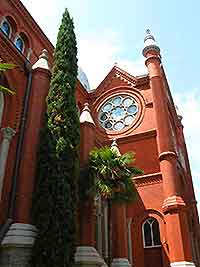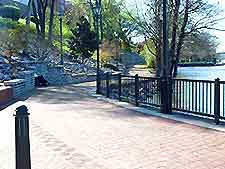Augusta History Facts and Timeline
(Augusta, Georgia - GA, USA)

The colorful history of Augusta began long before golf was ever invented, at a time when the area was a favorite Savannah River crossing for Cherokee Creek Native American Indians.
European settlement took place in 1735 after the British colonial founder of nearby
Savannah, James Oglethorpe, dispatched troops under Englishman Noble Jones to establish a defensive settlement against the French and Spanish, at the point where the river became navigable. The fledgling town was named Augusta after the Princess of Wales, Augusta of Saxe-Gotha.
Homesteads were soon established on the flat river plain, with the newcomers coexisting peacefully with the local tribes. In 1739, a road linking to Savannah enabled access to the new settlement by horse, causing an increase in settler numbers. Initially, slavery was banned by Oglethorpe, although later it took an integral place in the history of Augusta and the state.
Revolution
During the second half of the 18th century, Augusta's peaceful lifestyle was shattered by the American Revolution. The town briefly became the state capital after Savannah's surrender to British forces, making it a prime target. By early 1779, troops under the command of Lt Col Archibald Campbell were in control, although they soon withdrew after sighting American troops on the opposite bank of the Savannah River. The town changed hands once more during the war before the British were defeated.

Post-war Regeneration
During the aftermath of the conflict, the new Augusta Canal and the Georgia Railroad boosted the town's economy. By the 1850s, it became a leader in the manufacture of paper, gunpowder and textiles due to its transportation links to
Atlanta, as well as to the Tennessee River at
Chattanooga, giving access to the great Mississippi River. By 1860, Augusta was home to industry, commerce and a population of over 12,000, but troubled times loomed on the horizon.
Civil War History
The Civil War began in 1861, in response to Abraham Lincoln's election as president. At this time, 11 of the slave states in the south, including Georgia, broke away from the Union and formed the Confederacy. Augusta was a Confederate town, with at least 2,000 of its residents going to battle. By 1863, thousands of refugees had flooded into the town, which itself was threatened by the advance of General Sherman's Union army. During the post-war reconstruction period, Augusta was placed under martial law, although the city fathers were quick to restrict the civil rights of former slaves.

Development in the 20th Century
By the early years of the last century, Augusta had prospered through its cotton markets, lumber trade and the presence of US Army bases nearby, although a devastating fire in 1916 destroyed most of its heritage buildings. Augusta's 'Golden Age' of history began post-WWII, with rapid development in industry sparked by hydroelectric power from a newly constructed dam.
Controversy arrived with the Civil Rights Movement in 1961, with demonstrations, riots and looting. In the 1970s, many businesses deserted the downtown district for new malls, with urban decay setting in. This lasted until the riverside district was regenerated and incorporated into an arts and leisure area, with particular emphasis around Broad Street. Most notably, the selection of the Augusta National Golf Club as the venue for the annual US Masters Golf tournament has really put this city on the map internationally.
 The colorful history of Augusta began long before golf was ever invented, at a time when the area was a favorite Savannah River crossing for Cherokee Creek Native American Indians.
The colorful history of Augusta began long before golf was ever invented, at a time when the area was a favorite Savannah River crossing for Cherokee Creek Native American Indians.
